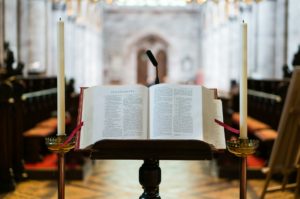In March 1848, the well-known Hartford pastor Horace Bushnell (1802 – 1876) gained a remarkable honor: he received invitations to deliver prestigious theological addresses at New England’s most famous educational institutions: Andover Seminary, Harvard, and Yale. The three schools, long since engaged in pitched theological battles with each other, all derived their inheritance from Puritanism. But times had changed. Harvard had become Unitarian while Andover and Yale argued over who was the rightful heir to Jonathan Edwards’ Calvinist legacy. In his addresses to these disputants, Bushnell lectured his audiences with the following message: your doctrinal quarrels are unnecessary; it is time we all simply got along.1
Bushnell naively believed he had discovered a way of putting an end to all theological controversy. In February 1849, he argued in God in Christ, the published version of his three talks, that language—the Bible in particular—does not offer objective rational truth about God. This explains why he so blithely thought that Unitarians and orthodox Calvinists could easily put aside their differences. Both groups thought they accurately understood the nature of God. The former denied that Jesus was divine. The latter rightly considered this heresy. But the two sides agreed on one thing: they could not both be right.
Bushnell swept away such debates over theology because he was a mystic who believed that truth was metaphorical, fluid, and constantly changing. Although he preferred the language of the Trinity to the colder-Deist version, he thought unity between the warring factions could be achieved if only they would give up their confidence in their theological convictions. Describing the virtues of his “big tent” approach, the Hartford pastor opined, “My ruling endeavor has been in all my investigations of truth, to find a form of doctrine broad enough to include, as far as possible, the opposing truths or half-truths which Christian believers are contending.”2 His desire for unity at all costs subsequently led him away from orthodoxy. Ironically, Bushnell satisfied no one. Calvinistic opponents branded him a heretic. For their part, the once intrigued Unitarians thought better of inviting him to take the Hollis Chair in theology at Harvard.
One might be tempted to conclude that Horace Bushnell was little more than a patron saint of lost causes who has long since been forgotten. Not so. From the turn of the twentieth century until the present, Bushnell has become a hero of theological liberalism, a thinker whose intellectual permissiveness led to generations of other pastors downplaying the centrality of biblical authority and historic Christian beliefs. His 1847 work on Christian Nurture expostulated the idea that children are not under the curse of the Fall, and therefore do not need to be “converted” to avoid damnation—a notion now commonly accepted in modern mainline Protestant denominations. Forebodingly, Bushnell was a man ahead of his times.
God’s people today are continually told that their beliefs are outdated, irrelevant, or in need of modification. Critics of evangelical theology chide their conservative counterparts for taking their beliefs too seriously and not having an “open mind.” They are told that the language of Christian belief is flexible and malleable to the vicissitudes of cultural opinion. The Church has heard such voices before, but the questions are fundamentally the same as they were in Bushnell’s time. Has God spoken objectively with finality in His written Word? If He has, what then must be believed? What must be denied? In light of these things, how must human beings live? The Scriptures have spoken clearly on all of these matters in spite of some—even those within the bounds of the organized religion—who would obscure the biblical message.
Footnotes:
1 For a thorough summary of Bushnell’s life and teaching, see Gary Dorrien, The Making of American Liberal Theology: Imagining Progressive Religion (Louisville: Westminster John Knox Press, 2001), 111-178.
2 Horace Bushnell, cited in Robert Bruce Mullin, The Puritan as Yankee (Grand Rapids: Eerdmans, 2002), 56.




